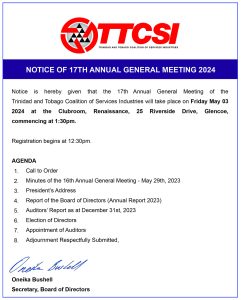We view the APD as unnecessary and discriminatory. It is a particularly stinging slap in the face when one considers that the recently signed Economic Partnership Agreement (EPA) is supposed to expand trade and result in developmental benefits for the Caribbean.
This tax will require UK tourists, already dealing with the effects of an economic slowdown, to pay more to come to the Caribbean. The fact that a family of four will have to pay as much as £400 more to come to the region (this will increase to as much as £600 in 2010), makes the magnitude of the impact quite clear. They will simply go elsewhere. The drop in arrivals will have a ripple effect through the rest of the economy.
The British government, in its April 2009 Budget, announced that it intends to increase the APD in November 2009 between 25%-87% depending on the class of travel, with a further increase expected in November 2010. The APD is currently considered a “Green Tax”, designed to account for aviations impact on the environment, which increases the further a person travels from a UK airport. Interestingly the new plan places the Caribbean in a more expensive tax category than the entire United States of America, inclusive of California, Alaska and Hawaii. Therefore, as it is, the plan is not only anti-competitive but also discriminatory.
While we acknowledge and respect the United Kingdom’s right to shape its National Policy, this action will be detrimental to Caribbean nations. Firstly, because many of our economies are tourism based and secondly because many of us have relatives and friends based in the UK, the increased cost of airfare will make it more difficult for us to earn a living and travel to visit with each other.
Students and their parents are therefore, likely to be among the hardest hit.
We would like to applaud the Caribbean governments who have united in the call for a repeal of the British Government’s discriminatory plans. We also fully support the Caribbean Tourism Organization, the Association of British Travel Agents and the Travel Trade Gazette in their opposition to this discriminatory measure. We join in stressing the urgency of this matter given that the traditionally peak travel season is almost upon us.
We shall also raise the matter officially with other Caribbean Services Coalitions and the CARICOM Secretariat at the upcoming Caricom Services Symposium from 15 – 17 June in Antigua.
It is patently unjust that in these difficult economic times, the Caribbean is being put at a considerable disadvantage by this move. Thus, the TTCSI hopes that a greater show of understanding, sensitivity and fairness is reflected in addressing and finalizing this issue.
Lawrence Placide,
President TTCSI





